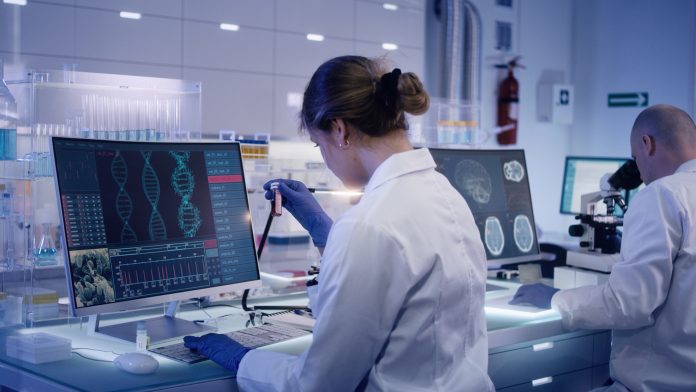
Radcliffe Department of Medicine at the University of Oxford have identified the gene responsible for doubling the risk of COVID deaths.
Scientists at the University of Oxford have uncovered that 60% of people with South Asian ancestry carry the high-risk genetic signal, which has shown to double the risk of COVID deaths. This potentially explains excess COVID deaths in some UK communities and the impact of the virus on the Indian subcontinent.
The study published in Nature Genetics was led by Professor James Davies and Jim Hughes at the University of Oxford’s MRC Weatherall Institute of Molecular Medicine. They used advanced technology to workout out which gene was causing the effect and how it was achieving it. Furthermore, previous investigations also found a stretch of DNA on chromosome 3 that doubled the risk of COVID deaths in adults under 65.
Uncovering the high-risk genetic signal
An Artificial Intelligence algorithm trained by the team at Oxford University analysed genetic data from hundreds of types of cells from all parts of the body to show the effects of the genetic signal on cells in the lung. Using a recently developed, highly accurate technique, researchers could zoom down on the DNA at the genetic signal. This examined how billions of DNA letters fold up to fit inside a cell to pinpoint the specific gene that was being controlled by the sequence causing the greater risk of a COVID-related death.
However, previous studies have proved challenging to identify the correct genetic signal. The study co-lead, Professor Jim Hughes, said: “The reason this has proved so difficult to work out is that the previously identified genetic signal affects the ‘dark matter’ of the genome. We found that the increased risk is not because of a difference in gene coding for a protein but because of a difference in the DNA that makes a switch to turn a gene on. It’s much harder to detect the gene which is affected by this kind of indirect switch effect.”
The study found surprising insight into the gene responsible for doubling the risk of respiratory failure from COVID-19; although several other genes were initially suspected, it revealed that a relatively unstudied gene called LZTFL1 caused the effect.
The researchers found that a higher risk version of the gene possibly prevents the cells lining the airways and the lungs from responding to the virus properly. However, it doesn’t affect the immune system, so researchers expect people carrying this version of the gene to respond normally to COVID-19 vaccines.
Which groups of people could potentially be affected by this gene?
60% of people with South Asian Ancestry carried this higher-risk version of the gene, whereas only 15% of those with European ancestry possessed it. This offers some explanation for why there were higher rates of COVID deaths and hospitalisations in the former group. It also found that 2% of people with Afro-Caribbean ancestry carried the higher risk genotype, meaning that genetic factor does not entirely explain higher COVID death rates reported for black and minority ethnic communities.
Professor James Davies, who worked as an NHS Consultant in Intensive Care Medicine during the pandemic and is an Associate Professor of Genomics at Oxford University’s Radcliffe Department of Medicine, explained: “The higher risk DNA code is found more commonly in some black and minority ethnic communities but not in others. Although we cannot change our genetics, our results show that the people with the higher risk gene are likely to particularly benefit from vaccination. Since the genetic signal affects the lung rather than the immune system, it means that the increased risk should be canceled out by the vaccine.”
What can be expected for the future?
Researchers are hopeful that drugs and other therapies will become available to target the pathway preventing the lung lining from transforming to less specialised cells, raising the possibility of new treatments customised for those most likely to develop severe symptoms.
Professor Davies added: “The genetic factor we have found explains why some people get very seriously ill after coronavirus infection. It shows that the way in which the lung responds to the infection is critical. This is important because most treatments have focussed on changing the way in which the immune system reacts to the virus.’
























